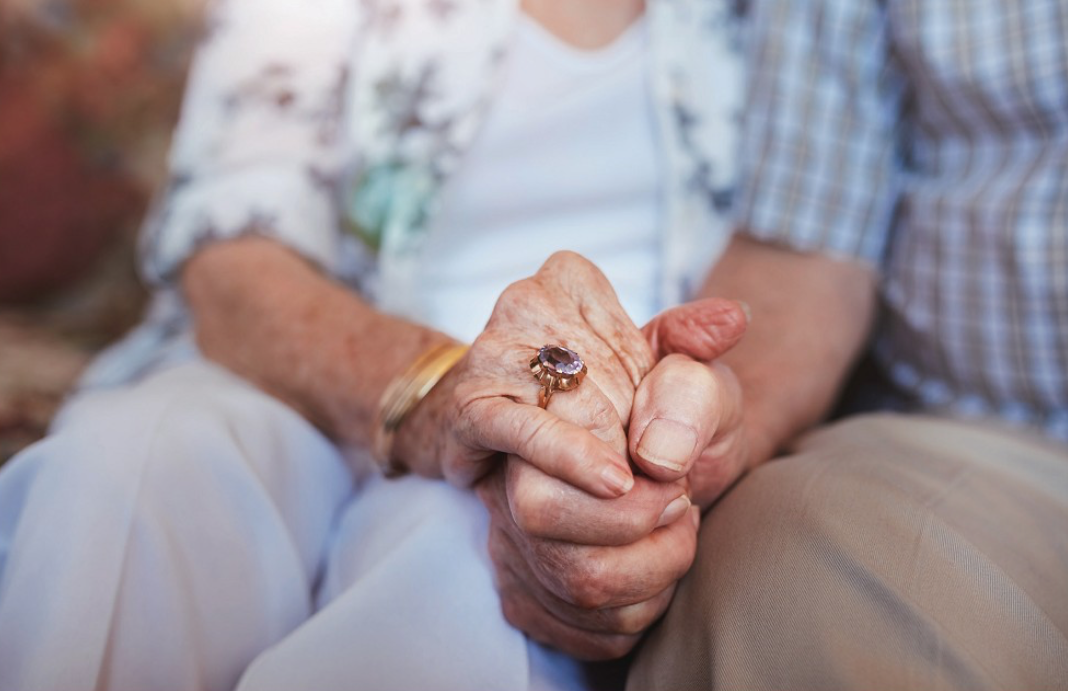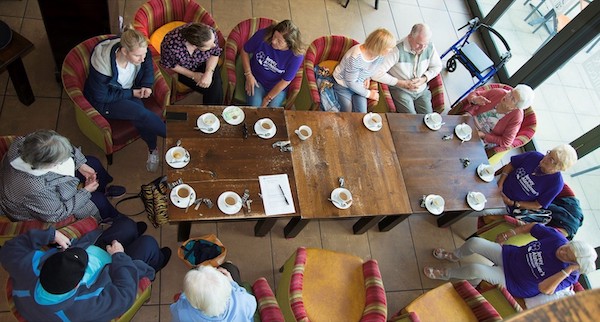

After receiving help from Dementia Jersey while she was caring for her partner Alan, Margot Kelly became a volunteer for the charity in his memory.
In this article, Dementia Jersey shares her story. Margot first noticed the signs of dementia when Alan was 73; he sadly passed in 2017 aged 77.
Alan lived at home with Margot as his carer and she didn’t have much respite except from a little bit of help from occupational therapists, who referred her to Dementiaa Jersey. She then met one of the charity'counsellor Sian and joined 'splash chat', where she could talk to people from the charity as well as other carers.
Following Alan's passing, Margot joined Dementia Jersey in 2017 and the charity's team describes her as "full of character, laughter and enjoys a good natter". "As with all our volunteers, we are incredibly lucky to have Margot as part of the team," they added.
“I became a volunteer, because I’m passionate, I talk about my experience all the time, it still hurts, but I want to help out as much as I can because I understand, because its therapeutic. It’s good for someone who has lost someone to talk.
Throughout my journey it felt like I was living in a bubble, and when that bubble burst, it was the weirdest thing. You’re so used to thinking, what are they doing, where are they, to then go to nothing. One of the hardest things throughout the journey was Alan always wanted to be with me, so it was hard to have a break.
I remember first going to our GP, Alan was very stubborn and difficult, he didn’t think anything was wrong, he would say ‘Why am I here, there’s nothing wrong with me?!’; he passed all the tests and went for a long time without getting diagnosed, just forgetting things, but I knew something wasn’t right.
From my experience I would encourage seeing your GP and getting checked ASAP - there isn’t a cure but you can get help to catch it early, to try and slow down progression, so you can try and live a normal life.
The biggest and hardest change to my life was losing the social side, I had to stop everything so I could look after him, to give him all of my attention. It became lonely, as you don’t have a conversation with that person anymore. You can sit & watch television but they’re not really watching. I’d go a week without laughing; I wouldn’t laugh because I thought, ‘why am I laughing?’ There’s nothing to laugh about.

Pictured: "You have to live with it to know it."
Alan withdrew into himself as he didn’t understand what was going on. I used to tell him ‘you have dementia’ but he didn’t understand. He loved joining ‘splash chat’ but it started getting harder after he started withdrawing, as he would just stand in the pool.
I had to give up my theatre work and going out with friends. Friends would say he’s alright - he wasn’t - but it’s because they couldn’t see it. You have to live with it to know it.
It’s so hard living with that person as you don’t know what they’re going to say or do next, which can be frightening. One of the biggest feelings I experienced was guilt. Thinking ‘why didn’t I do this, or why didn’t I do that.’
I used to feel guilty because I needed a break, I used to do all sorts of strange things like disappear to the car and grab on to the steering wheel, thinking ‘how am I going to cope’ as you just don’t know what that person is going to do, how they’re going to react.

Pictured: Margot said the carers need help as well as their loved ones.
It’s so difficult, and that’s why the carers need help as well. Those are the ones that are struggling, they don’t know what to do, they don’t know how to cope. Their life changes, and that is the concern as they don’t always have the respite they need. I’ve had someone ring me up screaming down the phone saying, ‘I just don’t know what to do, I don’t know what to do!’
People say it is what it is, and that it’s unfortunate, but it doesn’t make it easier.
I still hear it now, people don’t realise how bad it is; that is why through Dementia Jersey I have met some really great friends, as they understand, and it’s kept me going.
It was hard a journey, but I learnt so much more through the charity.

Pictured: Get the help you need; get the advice you need. You need to talk."
Joining the parish pursuits was amazing, it was great to go out and talk to people. You feel good as you’ve done something worthwhile. What I noticed though, and this is where the stigma is still associated with dementia, is that people don’t want to admit they need help, until they start talking and sharing experiences, helping them realise they are not on the journey alone.
If anyone has any inkling of their partner, husband, wife, friend or family, contact the charity, make sure you contact them. Get the help you need; get the advice you need. You need to talk, it is no good just getting the leaflets as that can be overwhelming, getting the support and talking is so important. By coming to the charity and speaking to others, I felt more knowledgeable.
There are a lot of people there who are willing to help, you have Sian & Rachel (Dementia advisors) who are fantastic and I’m here to share experience too. Join the community as it’s good to talk. If you’re worried in any way, talk to someone about it, as there’s nothing worse than holding it in.”
If you would like to volunteer with Dementia Jersey, contact Volunteer & Activities coordinator Dan Du Heaume on dan@dementia.je or 01534 723519.